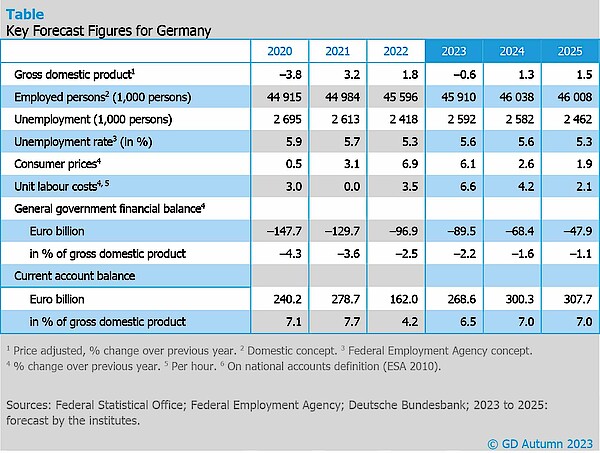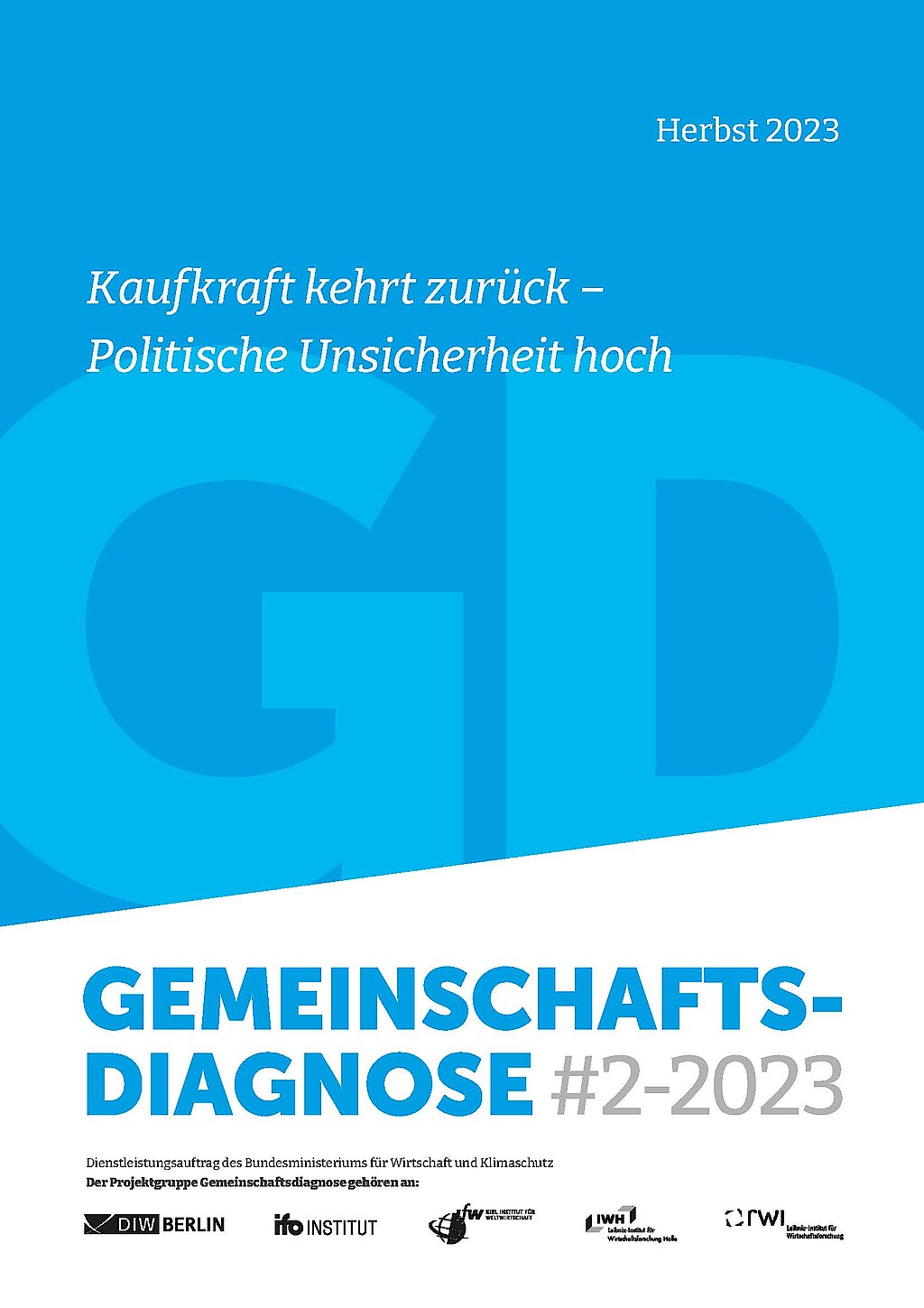Joint Economic Forecast 2/2023: Purchasing power returns ‒ political uncertainty high
Germany has been in a downturn for more than a year. The sharp rise in energy prices in 2022 put an abrupt end to the recovery from the pandemic. Consumer price inflation, which was already on the rise, has risen to over 8%. This is taking purchasing power away from private households. Key interest rates have risen by over four percentage points, hitting the construction industry in particular.

Business sentiment has recently deteriorated again, not least because of heightened political uncertainty. Overall, the indicators suggest that production fell again noticeably in the third quarter of 2023. However, wage increases have meanwhile followed the price hike, energy prices have fallen, and exporters have partially passed on their higher costs, so that purchasing power is returning. Therefore, the downturn is expected to subside by the end of the year, and the degree of capacity utilisation will rise again going forward.
The institutes’ forecast of 1.3% for 2024 is only 0.2 percentage points below their spring forecast. In the following years, a decreasing potential growth rate due to the shrinking labour force will become more and more apparent.
The downturn has meanwhile reached the labour market. However, the institutes expect only a moderate increase in unemployment to 2.6 million people in 2023. In the coming year, the number of unemployed will probably decrease somewhat.
On the price front, the situation is gradually easing. The inflation rate is expected to be 6.1% in 2023 and to decline to 2.6% in 2024. The institutes see core inflation (inflation excluding energy prices) at 6.1% in the current year and 3.1% in 2024.
Full-length version of the report (in German)
Joint Economic Forecast Project Group: Purchasing power returns ‒ political uncertainty high. Autumn 2023. Halle (Saale) 2023.
The full-length version of the report is available here.
About the Joint Economic Forecast
The Joint Economic Forecast is published twice a year on behalf of the German Federal Ministry for Economic Affairs and Climate Action. The following institutes participated in the autumn report 2023:
- German Institute for Economic Research (DIW Berlin)
- ifo Institute – Leibniz Institute for Economic Research at the University of Munich in cooperation with the Austrian Institute of Economic Research (WIFO) Vienna
- Kiel Institute for the World Economy (IfW Kiel)
- Halle Institute for Economic Research (IWH) – Member of the Leibniz Association
- RWI – Leibniz Institute for Economic Research in cooperation with the Institute for Advanced Studies Vienna
Scientific Contacts
Professor Dr Oliver Holtemöller
Halle Institute for Economic Research (IWH) – Member of the Leibniz Association
Phone +49 345 7753 800
Oliver.Holtemoeller@iwh-halle.de
Dr Geraldine Dany-Knedlik
German Institute for Economic Research (DIW Berlin)
Phone +49 30 89789 352
gdanyknedlik@diw.de
Professor Dr Timo Wollmershäuser
ifo Institute – Leibniz Institute for Economic Research at the University of Munich
Phone +49 89 9224 1406
Wollmershaeuser@ifo.de
Professor Dr Stefan Kooths
Kiel Institute for the World Economy (IfW Kiel)
Phone +49 431 8814 579 or +49 30 2067 9664
Stefan.Kooths@ifw-kiel.de
Professor Dr Torsten Schmidt
RWI – Leibniz Institute for Economic Research
Phone +49 201 8149 287
Torsten.Schmidt@rwi-essen.de
Whom to contact
For Researchers

Vice President Department Head
If you have any further questions please contact me.
+49 345 7753-800 Request per E-MailFor Journalists

Internal and External Communications
If you have any further questions please contact me.
+49 345 7753-832 Request per E-MailIWH list of experts
The IWH list of experts provides an overview of IWH research topics and the researchers and scientists in these areas. The relevant experts for the topics listed there can be reached for questions as usual through the IWH Press Office.
Related Publications

Gemeinschaftsdiagnose: Kaufkraft kehrt zurück – Politische Unsicherheit hoch
in: Dienstleistungsauftrag des Bundesministeriums für Wirtschaft und Klimaschutz, 2, 2023
Abstract
<p>Deutschland befindet sich seit über einem Jahr im Abschwung. Der sprunghafte Anstieg der Energiepreise im Jahr 2022 hat der Erholung von der Pandemie ein jähes Ende bereitet. Die schon zuvor anziehende Verbraucherpreisinflation ist zwischenzeitlich auf über 8% gestiegen. Dadurch wird den privaten Haushalten Kaufkraft entzogen. Die Leitzinsen sind um über vier Prozentpunkte gestiegen. Das trifft insbesondere die Bauwirtschaft. <br /><br /> </p> <p>Die Stimmung in den Unternehmen hat sich zuletzt erneut verschlechtert, dazu trägt auch politische Unsicherheit bei. Insgesamt deuten die Indikatoren darauf hin, dass die Produktion im dritten Quartal 2023 nochmals spürbar gesunken ist. Allerdings haben mittlerweile die Löhne aufgrund der Teuerung angezogen, die Energiepreise abgenommen und die Exporteure die höheren Kosten teilweise weitergegeben, sodass Kaufkraft zurückkehrt. Daher dürfte der Abschwung zum Jahresende abklingen und der Auslastungsgrad der Wirtschaft im weiteren Verlauf wieder steigen.<br /><br /> </p> <p>Alles in allem wird das Bruttoinlandsprodukt im Jahr 2023 um 0,6% sinken. Damit revidieren die Institute ihre Prognose vom Frühjahr 2023 kräftig um 0,9 Prozentpunkte nach unten. Der wichtigste Grund dafür ist, dass sich die Industrie und der Konsum langsamer erholen als im Frühjahr prognostiziert worden war. Für das Jahr 2024 liegt die Prognose mit 1,3% nur 0,2 Prozentpunkte unter der aus dem Frühjahr. Danach wird sich bemerkbar machen, dass das Potenzialwachstum aufgrund der schrumpfenden Erwerbsbevölkerung mittelfristig deutlich zusammenschmilzt.</p>



